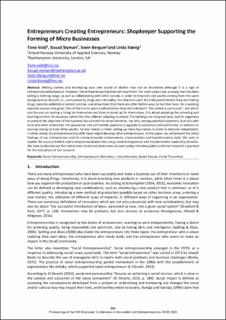Entrepreneurs creating entrepreneurs: shopkeepers supporting the forming of micro businesses
Peer reviewed, Journal article
Published version
Permanent lenke
https://hdl.handle.net/11250/3107299Utgivelsesdato
2023Metadata
Vis full innførselSamlinger
Sammendrag
Making clothes and developing your own brand of clothes may not be innovative although it is a sign of entrepreneurial behaviour. However, the entrepreneurship does not stop there. For some years now, a young man has been selling a clothing range, as well as collaborating with other brands, in order to help kids and youths coming from the same background as himself, i.e., surrounded by drugs and criminality. His idea is to catch the kids/youths before they start taking drugs, become addicted or commit a crime, and show them that there are other better ways to live their lives. He is working towards several new goals: One of them is to open a school where they not only learn “the ordinary curriculum”, but which also focuses on making a living for themselves and how to stand up for themselves. It is about adapting the schooling and learning to their life situation, rather than the children adapting to school. The earnings are not great (yet), but his eagerness to present the objective of the business has earned him some attention, not only among potential customers, but also with local and other authorities. His passionate and yet humble appearance appeals to customers and authorities. In addition to earning money to fund other youths, he also invests in them setting up micro businesses in order to become independent. In other words, his entrepreneurship skills have helped develop other entrepreneurs. In this paper, we will present the initial findings of our entrepreneur and his entrepreneurial achievements, characteristics and transformative style. We seek to explain the success behind such entrepreneurial activities using social entrepreneur and transformative leadership theories. We have conducted our first initial semi-structured interviews via zoom using interview guides and more research is planned for the next phase of our research.

